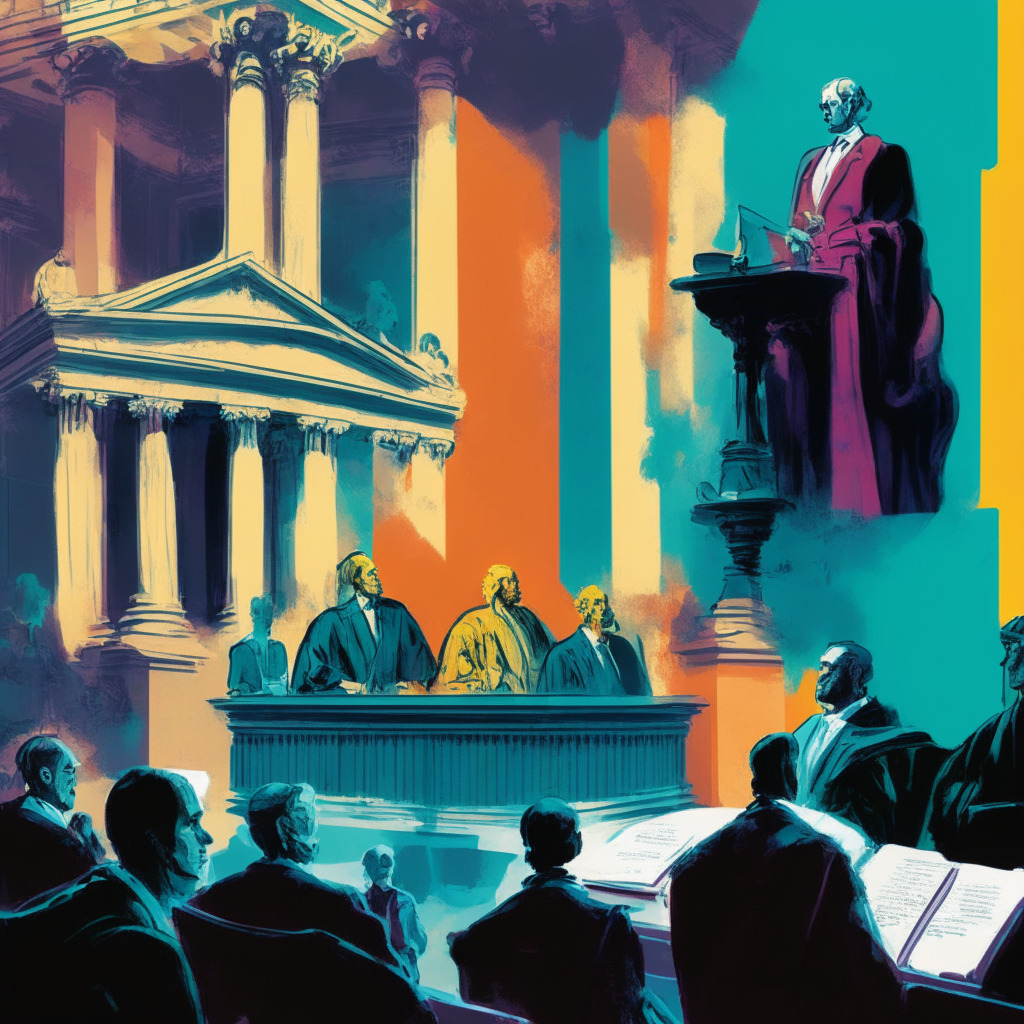US Senators Cynthia Lummis and Kirsten Gillibrand are to propose a new legislation known as the ‘Responsible Financial Innovation Act’, aimed at regulating cryptocurrencies and digital assets. The bill plans to classify most cryptocurrencies as commodities and enforce crypto exchanges to store consumer assets in third-party trusts, enhancing security. Critics argue it may also create unintended consequences.
Search Results for: Kirsten Gillibrand
Bipartisan Battle for Crypto: A Deep Dive into U.S. Digital Asset Regulation
Senators Kirsten Gillibrand and Cynthia Lummis have introduced a new crypto bill, the Responsible Financial Innovation Act, aimed at addressing regulatory ambiguity in the US cryptocurrency industry. This legislation could shift the oversight of most digital assets from SEC to the Commodity Futures Trading Commission.
Roadmap to Regulations: Unveiling the U.S. Senators’ Bill for Comprehensive Crypto Laws
U.S. Senators Cynthia Lummis and Kirsten Gillibrand unveiled a revised draft for comprehensive crypto regulation, marking an evolution from a previous draft penned a year ago. The bill addresses decentralized finance definition, anti-money laundering provisions, custody rules and grants the CFTC decisive control over crypto issuers, alongside defining roles for the SEC.
Exploring the Impact of the Responsible Financial Innovation Act on Cryptocurrency Future
US Senators Cynthia Lummis and Kirsten Gillibrand plan to reintroduce the Responsible Financial Innovation Act, a regulatory bill for digital assets. The legislation aims to define the SEC and CFTC roles in regulating digital assets and enhance consumer protection, potentially safeguarding against future market crashes. However, there are fears that this could suppress innovation in the sector.
Senator Lummis Leading Crypto Regulation Revolution: Key Advancements & Challenges Ahead
Senator Cynthia Lummis and Kirsten Gillibrand are co-sponsoring the Responsible Financial Innovation Act, aiming to create a “robust legal framework” for digital assets in the U.S. amidst tensions between regulators and crypto firms. The bill seeks to define digital assets as commodities or securities and impose requirements on stablecoin issuers.
Upcoming Crypto Bill: Balancing Innovation and Consumer Protection in the US Market
US Senators Cynthia Lummis and Kirsten Gillibrand are working on a bipartisan effort to introduce comprehensive regulations for cryptocurrencies, aiming to provide clarity within the digital asset sector. The forthcoming crypto bill intends to define cryptocurrencies, potentially remove the “security” label, and impose a universal ban on algorithmic stablecoins. Challenges remain in balancing innovation and consumer protection.
The US Political Unrest: A Roadblock for Crypto-focused Bills and Digital Asset Future
“The threat of a US government shutdown could influence the future of digital assets. Crypto-focused bills like the FIT, Blockchain Regulatory Certainty Act, and Keep Your Coins Act risk being delayed. Any shutdown could stall these bills’ progress until government funding is secured for the next fiscal year.”
Failing or Succeeding? Evaluating The Blockchain Association’s Influence on Crypto Legislation
The Blockchain Association, a leading crypto trade association, continues to face skepticism and regulatory hurdles despite its five-year existence. With progress impeded by the fall of FTX and reduced support from congress members, the association’s efforts to pass comprehensive crypto legislation remain unsuccessful. Notwithstanding these setbacks, it has managed some victories in mitigating impacts of proposed regulations and supporting member companies. However, the future still presents significant obstacles, and crypto lobbyists are urged to remain humble about their “achievements.”
Exploring the Political Spectrum: The Rising Influence of Bitcoin Mining and Cryptocurrencies
Senator Ted Cruz endorses Bitcoin, highlighting its potential in bolstering energy grid resilience—an advantage in emergencies, such as the recent Texas extreme weather. The stance reflects the growing influence of digital currencies, despite potential hurdles and economic turbulence.
Redefining Boundaries: SEC, Coinbase Lawsuit, and the Call for Crypto Regulation Reformation
U.S. Senator Cynthia Lummis and crypto experts assert that the SEC’s examination of crypto trading platforms, like Coinbase, as unregistered securities exceeds their jurisdiction. The SEC’s authority question, they believe, should rest with Congress. Much debate exists around immediacy and breadth of crypto regulation, with an emphasis on establishing comprehensive, globally mindful approaches to build trust in the market.
Navigating the New Terrain: Implications of the NDAA Bill on Crypto Privacy and Regulation
The U.S. Senate has passed the National Defense Authorization Act, imposing new regulations on the digital asset world, including privacy coins and crypto mixers. The regulations aim to stem crypto-related fraud and are expected to force an elevation in crypto regulatory standards, obliging authorities to crack down on anonymous crypto transactions. The discourse reflects the conflict between privacy freedoms versus governance needs in the crypto sector.
2024 NDAA and Crypto: Striking Balance between Oversight and Innovation
The United States Senate has passed the 2024 National Defense Authorization Act that targets crypto mixers, crypto trading institutions, and anonymous coins. The bill draws provisions from the Digital Asset Anti-Money Laundering Act and the Responsible Financial Innovation Act for improved oversight on crypto-based activities. Key measures include examination standards for crypto, preventing FTX-style events, and studies to curb anonymous crypto transactions.
U.S. Senate Tightens Crypto Regulations in NDAA 2024: A Necessity or Threat to Blockchain Freedom?
The U.S. Senate’s passage of the 2024 National Defense Authorization Act introduces tighter regulations for financial institutions engaged in crypto trading, marking a significant legislative shift. The bill targets crypto mixers and “anonymity-enhancing” crypto assets and aims to strengthen compliance with money laundering and sanctions laws.
Coinbase CEO Meets US Lawmakers: Future of Cryptocurrency Legislation
The upcoming meeting between Coinbase CEO and US lawmakers could greatly influence cryptocurrency legislation. Topics include impacts of crypto technology on security, privacy, and climate, as well as crypto legislation. This meeting arrives amidst legal disputes and mixed opinions on potential regulations possibly hindering innovation and transaction privacy.
Digital Asset Mining Tax: Hindering Innovation or Addressing Energy Concerns?
The proposed Digital Asset Mining Energy excise tax (DAME) has divided opinions between those who view it as a hindrance to cryptocurrency industry innovation and those believing it addresses energy consumption concerns. Meanwhile, cryptocurrency regulation legislation, such as the Responsible Innovation Act and stablecoin bills, continue to evolve, shaping the future landscape of digital assets.
Biden’s 30% Crypto Mining Tax: Innovation Killer or Eco-Friendly Move? Pros & Cons Explored
Senator Cynthia Lummis opposes the proposed 30% tax on cryptocurrency miners in the Biden Administration’s budget for 2024, citing environmental benefits. The proposed tax has sparked debates surrounding innovation, blockchain development, and consumer protection, with concerns it may hinder cryptocurrency adoption in the US.
US Congress Urged to Form Digital Asset Commission: Balancing Innovation and Regulation
The Chamber of Digital Commerce urges the US Congress to establish legislation concerning digital assets and create a “Digital Asset and Blockchain Technology Solarium Commission.” This Commission would facilitate cooperation between government, industry, and academia, providing direction for the future of US blockchain and digital asset research and development.
Navigating the Regulatory Maze: US Crypto Laws and Impact on Bitcoin’s Future
Billionaire hedge fund manager Paul Tudor Jones recently highlighted Bitcoin’s “real problem” in the U.S. – unfriendly regulation. This tug of war between safety and innovation affects the growth and acceptance of cryptocurrencies. US lawmakers are currently working on legislation, such as a revised version of the Responsible Innovation Act, aiming to strike a balance between protecting investors and fostering innovation in the cryptocurrency market.
US
The US is considering adopting Europe’s cryptocurrency regulation model, MiCA, for increased transparency, security, and consumer protection. However, concerns about privacy, personal freedom, and stifling innovation must be balanced in this evolving regulatory landscape.


















